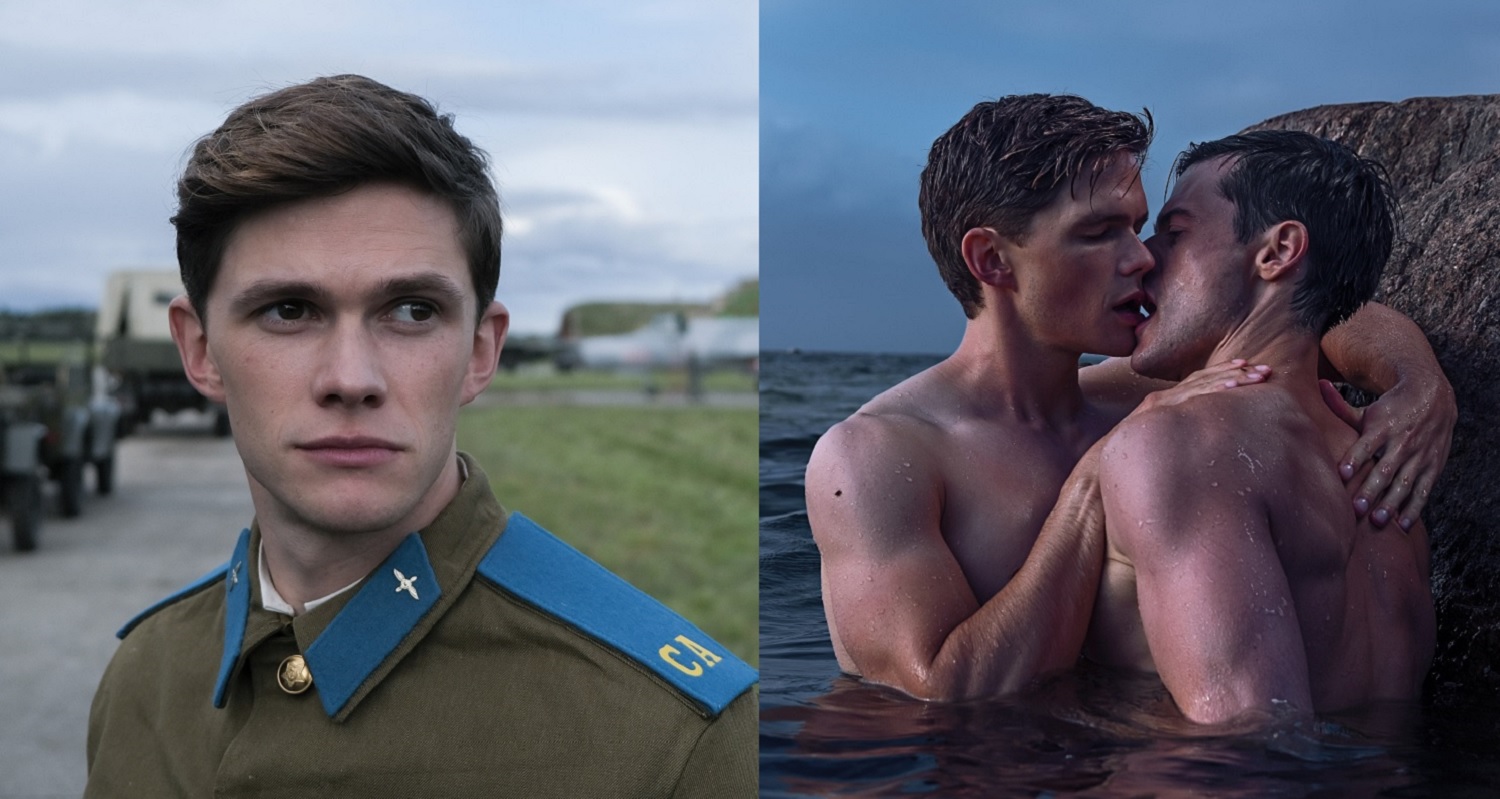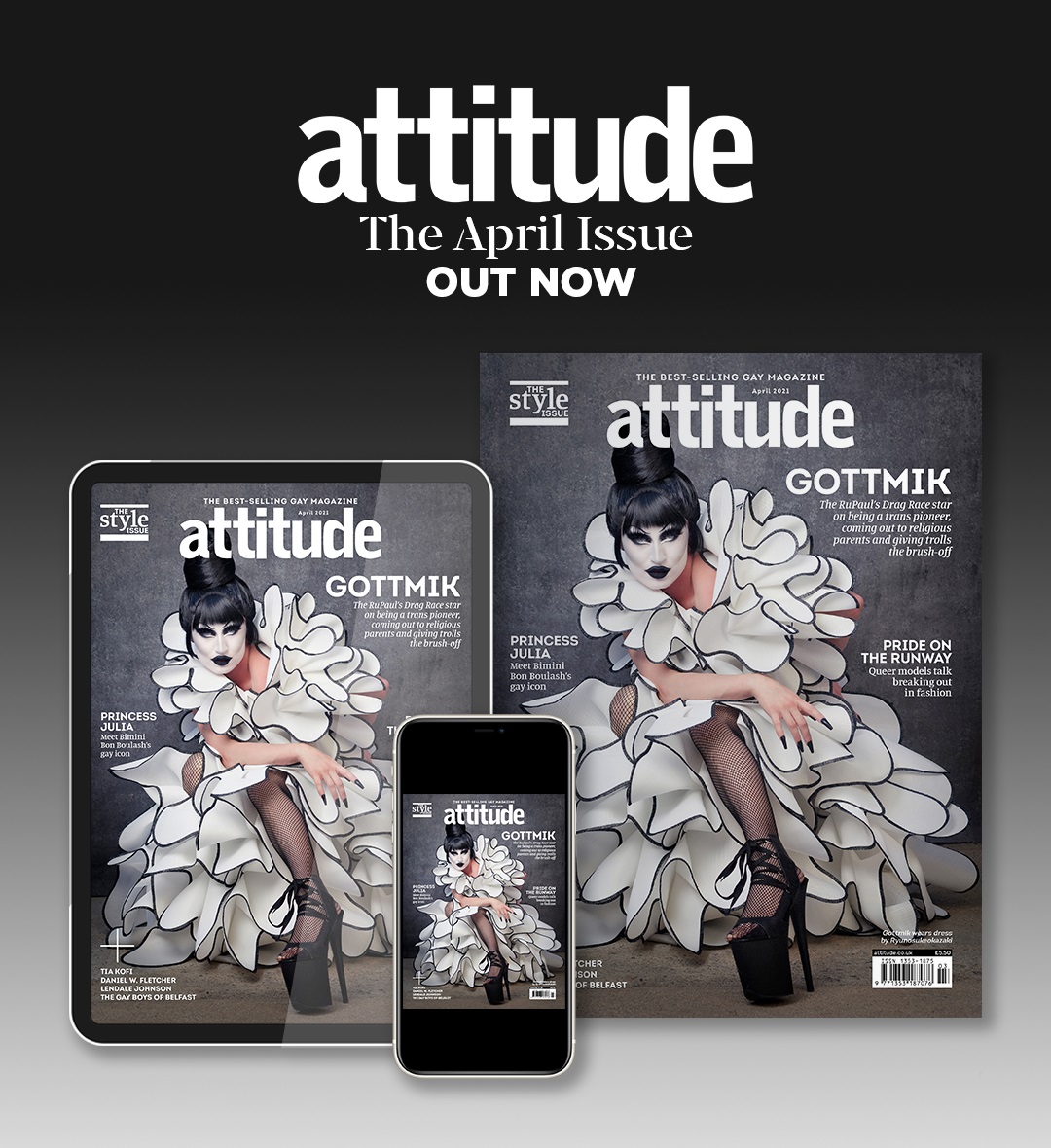Firebird’s Tom Prior on Soviet Air Forces-set gay love movie: ‘I got to keep the uniforms!’
Excl: Star on coordinating sex scenes, asking "probing questions" on an Estonian Defence Forces research mission and "dear friend" Stephen Fry

Words: Jamie Tabberer; pictures: Tom Prior in Firebird (left) and Tom with Oleg Zagorodnii (right)
“Oh yeah, I’ve got them all!” laughs Tom Prior when Attitude asks if he got to keep the impeccably tailored uniforms from his Cold War-era film Firebird.
“We had them custom-made and kept them in case we needed pickup shoots,” the 31-year-old adds, speaking from Estonia via Zoom. “Now they’ll maybe be pulled out as a costume party or something!”
In this smouldering new thriller, Tom plays Sergey, a puppyish soldier who starts an illegal affair with a strapping fighter pilot played by Oleg Zagorodnii. The men are so handsome, the outfits so arresting, this writer couldn’t help but be reminded of Tom of Finland’s oeuvre.
“It’s not something we consciously did,” says Tom of my comparison. “But the uniforms may be tighter than they would have been.”

“We never made this film for political reasons”
That’s not to misrepresent Firebird as sexy for the sake of it. The heart of the story is a tender and sweeping gay romance that feels loaded with meaning – not least for the viewers in some former Soviet Union countries, where queer rights lag. (Take Russia’s anti-gay propaganda law and Chechnya’s anti-LGBTQ purge, for example.)
“We never made this film for political reasons,” admits Tom, who co-wrote Firebird. “But I hope it touches people within those countries”

Here, the actor – whose films include Kingsman: The Secret Service and The Theory of Everything – reveals all about asking the Estonian Defence Forces “probing questions” during a research mission and why fashion king Tom Ford is a major inspiration.
How did you become involved in Firebird?
In 2014 I was in LA working. I was introduced to a film financier. She said “I’ve heard about this story set in the Russian Air Force at the height of the Cold War.” I thought it was curious. I’d been writing my own narrative – a line between friendship and something more. I was like, ‘wow, this is a fascinating backdrop for this relationship’. There was an early version of the script Peeter [Rebane, the director] had written. I made some suggestions, many pages of notes, which ended up a fully-fledged rewrite!

How did you prepare for the role?
I was lucky enough to be sent to the Estonian Defence Forces to do some hanging out with them, to be in a military environment and adhere to the authority there, which was very useful. Conscription is actually still in play in Estonia.
Did you connect with any LGBTQs during that research?
That’s a really good question. I’m trying to think. I wasn’t there for that long, but I did ask some probing questions, and didn’t get too many answers. There was more of this discussion of it not being a discussion. But I can imagine things certainly do still go on.
Did you have intimacy coordinators on set for the sex scenes?
No, we didn’t. I guess it would not be untrue to say I was effectively coordinated it. But discussing it closely with Oleg and Peeter. What we had wished to do, the intention – it needs to be character-based as opposed to downright gratuitous. For me, Peter and Oleg, we agreed it was about the mergence of souls. The sex scene, when I was saying lets go here, or try this and do that – choreographing, actually, around the room – it was this dance into melting intimacy. It was important to me that it was a soulful connection, true to what the story is based on.

Was there any temptation to have the three main characters enter an open relationship?
For me, it’s interesting, this dynamic. Where does a connection between two people become something more? It’s a sliding, changing mix of feelings. We didn’t want to be too much in the direction of it being open between the three, simply because we had to change Luisa’s character [Sergey’s love rival, played by Diana Pozharskaya, pictured above] very significantly from the original story. She was originally depicted as quite a dislikeable character – villainous towards the boys. So, we’d already made big strides in adjusting those relationships.
Stephen Fry recently tweeted about you and the film. How do you know him?
He was a dear supporter of mine when I was in the West End in 2013. He’s always been an advice giver, when it comes to agents or career decisions, and a dear friend. I’m humbled to have him to go to, with his wealth of experience within this life as well as this business.

You co-starred with Taron Egerton in Kingsman: The Secret Service – he played an iconic gay character in 2018’s Rocketman. Was he in touch with any words of advice?
No, I haven’t heard from Taron, but I know he’s doing really well with various different roles right now. It was a privilege, to be part of that production – my first after leaving the West End. I hold that project close to my heart as an initiation into the world of big scale moviemaking.
Do you have a favourite LGBTQ-themed movie?
Without fail, one of my favourites of all time is Tom Ford’s A Single Man. A big influence of mine with regards to style and framing. It’s inspiring.
Were the uniforms designed anew or were they replicas?
They were based on Soviet uniforms but have their own intricacies to make sure they’re not by any means interfering with any copyright.
What was your favourite day on set?
There were so many curious, different experiences. A highlight: crawling through the mud with this gun. Just before doing it, the crew was hosing it, making it horrible and disgusting. You can blame the writers, but it’s like, ‘who wrote this? Oh yeah – I wrote this!’ There was nowhere to have a shower.
What was the most challenging part of the shoot?
I was so immersed in the character. I’d be like, ‘is this my emotional reaction, or the character’s?’ You’re dealing with high-stakes emotions. Also, very long days. Because you’re in front of the camera, it can be quite unforgiving if you’re looking tired!
Firebird is screening as part of the BFI Flare: London LGBTIQ+ Film Festival, running from 17 to 28 March 2021.
Read the Attitude April Style issue, out now to download and to order globally.
Subscribe in print and get your first three issues for just £1 each, or digitally for just over £1.50 per issue.

